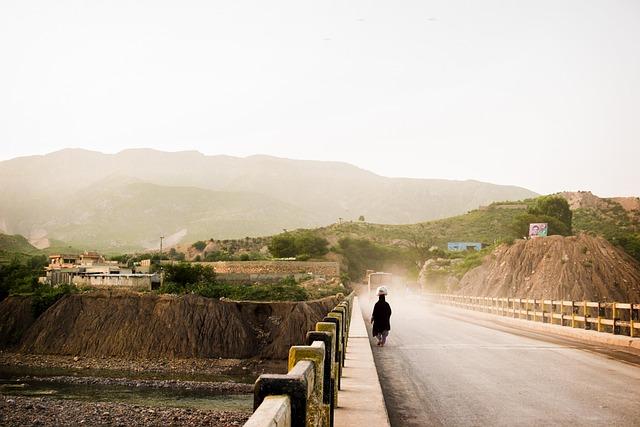In the vibrant tapestry of South Asia, Pakistan stands at a pivotal crossroads, where the embers of potential intertwine with the challenges of the present. As the world adjusts to the seismic shifts in trade dynamics and economic policies, Pakistan’s economy, rich in resources and entrepreneurial spirit, yearns for revival. An intricate balance of tradition and modernity, the nation’s landscape is dotted with opportunities for reinvention and growth. This article embarks on a journey to explore the future of trade and commerce in Pakistan, delving into the multi-faceted strategies that can breathe new life into its economy. From cultivating international partnerships to embracing technological advancements, we will examine the pathways that can transform Pakistan into a dynamic hub of economic activity, showcasing the resilience of its people and the promise of a prosperous tomorrow. Join us as we navigate the intricacies of trade and commerce, and envision a revitalized economic landscape that not only meets the aspirations of its citizens but positions Pakistan as a key player on the global stage.
Rethinking Trade Policies for Sustainable Growth
As the global landscape of trade continues to evolve, Pakistan must pivot towards sustainable policies that prioritize both economic growth and environmental responsibility. This calls for a reexamination of current trade agreements to embed sustainability into their core. By fostering partnerships that champion green innovation and ethical sourcing, the nation can attract foreign investment while promoting local industries. Forging relationships with countries committed to sustainability can also pave the way for technology transfers that empower local businesses and create job opportunities.
To facilitate this shift, policymakers will need to adopt a multifaceted approach that includes:
- Enhancing Regulatory Frameworks: Streamlining regulations that encourage sustainable practices in manufacturing and trade.
- Incentivizing Green Technologies: Providing subsidies or tax breaks for businesses that invest in renewable energy or reduce emissions.
- Promoting Fair Trade: Ensuring that trade practices favor equitable labor conditions and fair wages for workers.
A collaborative effort among stakeholders, including the government, private sector, and civil society, is essential for cultivating an ecosystem where sustainable trade can flourish. This unified approach not only enhances Pakistan’s image globally but also reinforces the resilience of its economy amidst changing international dynamics.

Harnessing Technological Innovation in Commerce
The intersection of technology and commerce is a fertile ground for innovation, particularly in bustling markets like Pakistan. Entrepreneurs and businesses must embrace digital tools to modernize operations and reach broader audiences. By leveraging technologies such as artificial intelligence, blockchain, and e-commerce platforms, local firms can streamline processes, enhance transparency, and drive efficiency. The flexibility offered by these technologies enables companies to adapt quickly to changing market demands, ensuring they remain competitive on both a local and an international scale.
Integrating technology into commerce also opens up new channels for collaboration and networking. Social media platforms, for example, serve as invaluable resources for startups looking to connect with investors and customers alike. To maximize these opportunities, businesses should consider:
- Developing user-friendly websites to enhance the customer experience.
- Utilizing data analytics to inform product development and marketing strategies.
- Exploring partnerships with tech companies to gain access to innovative solutions.
Moreover, the establishment of smart marketplaces can facilitate transactions in real time, creating a vibrant ecosystem that benefits everyone involved. The future of trade and commerce in Pakistan is intricately tied to these technological advancements, providing a pathway to economic rejuvenation.

Empowering Local Industries for Global Competitiveness
The pathway to global competitiveness lies in harnessing the untapped potential of local industries. By embracing innovative technologies and sustainable practices, Pakistani businesses can enhance their productivity and improve their product quality. Collaboration among stakeholders, including government agencies, educational institutions, and the private sector, can drive significant advancements in manufacturing processes. This synergy not only strengthens local capabilities but also positions Pakistan as a key player in the international market, eager to meet the growing demands of consumers worldwide.
To support this evolution, investment in infrastructure and trade facilitation is paramount. Establishing special economic zones, enhancing logistics networks, and offering financial incentives are crucial steps toward creating a robust commercial environment. Additionally, by promoting research and development within local industries, Pakistan can cultivate a culture of innovation that leads to the creation of unique products. The following table outlines key strategies for empowering local industries:
| Strategy | Description |
|---|---|
| Invest in Technology | Adopting advanced manufacturing techniques to boost efficiency and quality. |
| Enhance Skills | Offering training programs to develop a skilled workforce. |
| Market Access | Facilitating connections between local producers and international buyers. |
| Policy Support | Implementing supportive government policies to stimulate growth. |

Building Stronger International Partnerships for Economic Resilience
In a rapidly transforming global landscape, strengthening partnerships beyond borders is vital for enhancing economic resilience. By fostering collaboration with nations that share similar goals and interests, Pakistan can tap into diverse markets, engage in knowledge exchange, and accelerate technological advancements. Key areas of focus for these international partnerships include:
- Trade Facilitation: Streamlining customs procedures and reducing tariffs to make cross-border trade more efficient.
- Investment Opportunities: Attracting foreign direct investment through incentives and showcasing market potential.
- Capacity Building: Engaging in vocational training and industrial collaboration to enhance local skills and expertise.
- Joint Ventures: Encouraging partnerships between local businesses and foreign companies to create mutually beneficial projects.
These strategic alliances can not only help to diversify trade but also create a more resilient economy capable of withstanding external shocks. By examining successful models from other countries, Pakistan can better position itself in the global trade arena. A comparison of various partnerships could reveal valuable insights:
| Country | Partnership Focus | Benefits |
|---|---|---|
| China | Infrastructure Development | Increased connectivity and trade routes |
| Turkey | Trade Agreements | Market access and reduced trade barriers |
| UAE | Investment Promotion | Boosted foreign investment and tourism |
Insights and Conclusions
As we stand at the threshold of a new era for Pakistan, the threads of trade and commerce weave a tapestry rich with promise and potential. The path ahead may be riddled with challenges, yet within each obstacle lies the opportunity for innovation and growth. Reviving Pakistan’s economy is not merely a matter of policy adjustments or fiscal strategies; it is about reimagining a nation’s identity in the global marketplace.
In harnessing our geographic advantages, investing in human capital, and embracing technological advancements, Pakistan can redefine its role on the international stage. The collective efforts of government, businesses, and citizens will be paramount to crafting an ecosystem where trade flourishes, entrepreneurship thrives, and the economy resonates with the ambitions of a dynamic populace.
As we look to the future, let us remember that economic revival is a shared journey—a collaboration where every voice matters, and every initiative counts. Together, we hold the blueprint to transform potential into progress, creating a landscape where prosperity is not a distant dream but a tangible reality for all. In this shared ambition, we can illuminate pathways for growth, ensuring that the revival of Pakistan’s economy is a story of resilience, adaptability, and enduring hope.



